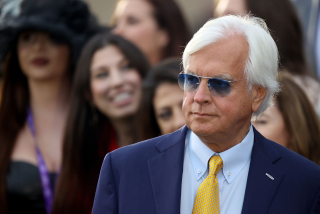Reynolds Out of U.S. Trials : Jurisprudence: Ruling by federal court of appeals will keep 400-meter runner from competing today.
- Share via
NEW ORLEANS — A federal appellate judge ruled late Friday that Butch Reynolds, who for two years has been fighting a heated legal battle to overturn his drug suspension, could not compete at the U.S. Olympic trials.
That stayed a ruling issued only hours earlier by a district court judge who had ordered officials here to allow Reynolds to run, despite a threat of an international ban against any athlete who competed with him.
Reynolds, the world record-holder at 400 meters, decided not to pursue the case in the U.S. Supreme Court, thereby exhausting all legal remedies that would have returned him to international competition before his suspension expires in August. His attempt to qualify for his second Olympic team also ended.
His court battle would ultimately have been for naught, however, as the U.S. Olympic Committee had already ruled that Reynolds is ineligible to compete at the Barcelona Games in August. Reynolds’ suspension ends three days after the closing ceremony.
In his ruling Friday, Judge Eugene E. Siler, Jr. of the 6th Circuit Court of Appeals in Cincinnati found that the threat of sanctions to other athletes by the International Amateur Athletic Federation, the sport’s international governing body, posed a greater potential for damage than excluding Reynolds.
In the second paragraph of his decision, Siler identified himself as a “dues-paying member of The Athletics Congress” and said he had informed counsels from both sides.
The three-page decision ended a day of legal maneuvering that over the past few months had marched its way up the ladder of American courts. It also ended the uncertainty for 31 other 400-meter runners here, who were unsure if they would jeopardize their Olympic eligibility by stepping on the track for today’s races.
Three 400-meter runners from the Santa Monica Track Club--Danny Harris, Steve Lewis and Antonio Pettigrew--went so far as to join the appeal of The Athletics Congress, which governs the sport in the United States. The athletes’ attorney, David Greifinger, submitted an affidavit asking that Reynolds not be allowed to run because of the IAAF threat.
Reynolds’ case has already become a landmark in international sports litigation. The Columbus, Ohio, native has presented one of the most persistent and high-level challenges to the authority of any governing body.
Reynolds has run in four meets by court order this season and has a U.S. trials’ qualifying time of 44.67. During the last several weeks he has received three temporary restraining orders and one preliminary injunction.
So it was something of a surprise that Reynolds decided not to seek recourse from the U.S. Supreme Court. TAC officials had assumed that Reynolds would take the next, and final, step. TAC had already filed affidavits with the Supreme Court in case its appeal in the 6th U.S. Circuit in Cincinnati was denied.
(The 400-meter preliminaries are scheduled to be run today at 2:45 p.m., local time. When a matter before the court involves a pressing time element, a single Supreme Court justice may decide a case.)
Reynolds’ attorney would not say why Reynolds--who said he has spent 21 months and $500,000 fighting his suspension--chose not to take his case to the nation’s highest court.
“TAC has demonstrated its willingness to destroy one of its athletes and it has done so,” said Mimi Dane, one of Reynolds’ attorneys in Columbus, Ohio. “We will see them in court.”
Dane was referring to a civil lawsuit in which Reynolds is seeking $12.5 million in damages from TAC and the IAAF.
It was the IAAF that suspended Reynolds, 28, for allegedly testing positive for anabolic steroids on Aug. 12, 1990, at a meet in Monte Carlo. Reynolds has maintained his innocence, saying the IAAF violated its own rules by improperly handling his urine sample.
It was a day of roller-coaster emotions for all concerned Friday. Reynolds held a victorious news conference earlier in the day after a federal district court judge in Columbus ruled he would suffer “irreparable harm” if he were denied the right to run.
“I am going to make the Olympic team,” he said. “I have faith in the heavenly father.”
Reynolds’ elation was dashed later Friday when the appeal went in TAC’s favor.
“This is certainly not a victory feeling for TAC,” said Frank Greenberg, TAC president.
Reynolds was not available for comment Friday night.
Friday’s legal maneuvering was the culmination of more than a year of court battles.
Immediately after the district court’s ruling to allow Reynolds to run, TAC and the U.S. Olympic launched a counterattack. They filed a joint appeal in the higher court.
After the first decision, the IAAF issued a statement saying the judge’s decision would throw the sport into “chaos” and set a dangerous precedent.
Ultimately, the precedent was set in the IAAF’s favor.
Because of the IAAF’s active participation in preventing him from competing, Reynolds named the federation in a civil and criminal contempt of court suit filed this week.
The question of whether the IAAF was bluffing and had no intention of carrying out disqualifications of all the men’s 400-meter runners here was answered Friday morning when the federation restated its threat.
The IAAF had already begun the process of suspending nine American runners who defied the prohibition and ran against Reynolds at meets in San Francisco and Holmdel, N.J.
Reynolds, the silver medalist in the 1988 Olympics, smashed the 400-meter world record in 1988, with a time of 43.29 seconds. That bettered Lee Evans’ record of 43.86 that had stood for 20 years.
* COMMENTARY: C6
More to Read
Go beyond the scoreboard
Get the latest on L.A.'s teams in the daily Sports Report newsletter.
You may occasionally receive promotional content from the Los Angeles Times.







